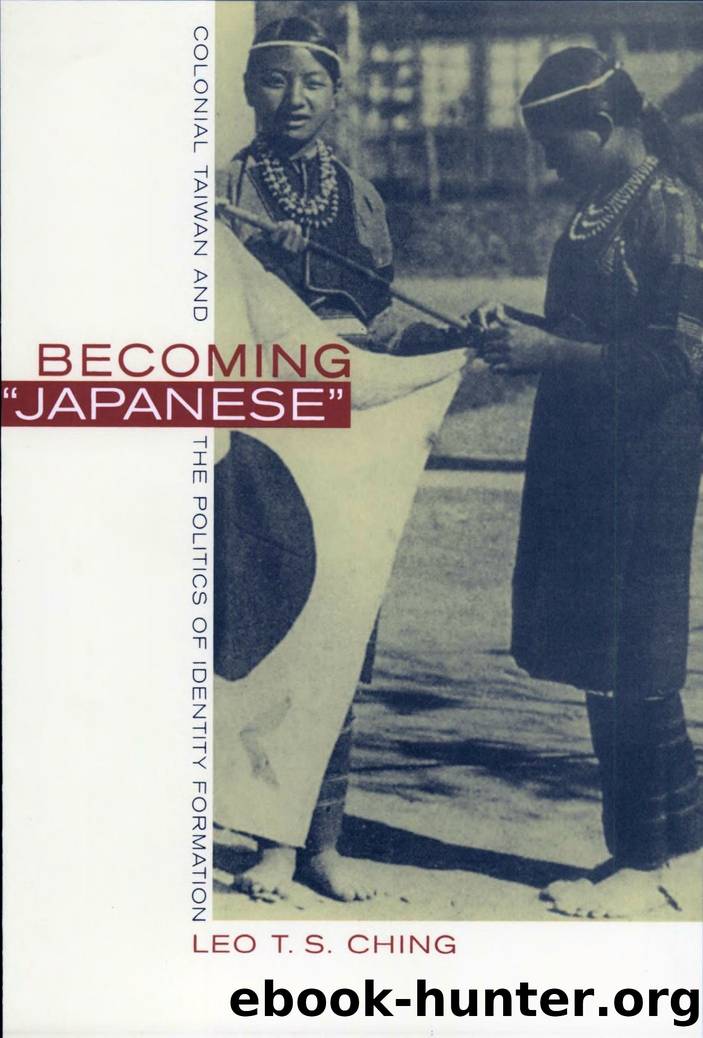Becoming Japanese: Colonial Taiwan and the Politics of Identity Formation by Leo T. S. Ching

Author:Leo T. S. Ching [Ching, Leo T. S.]
Language: eng
Format: epub
Tags: History, Asia, Taiwan, Non-Fiction
ISBN: 9780520925755
Google: JNNoCPffEssC
Amazon: B003ODJ9Q6
Publisher: University of California Press
Published: 2001-06-28T23:00:00+00:00
"There are aspects of "komin literature" that deserve sympathy. However, there are also responsibilities that writers of colonial Taiwan cannot avoid. Japanese colonial rule must be charged with having national responsibility as a victimizer and be exposed to severe criticism. However, as far as Taiwan is concerned, the reversal of the meaning of "non-komin literature" is also a returning of some dignity to Taiwan. The existence of "komin literature" serves as a good admonition for us.-
Lin's political commitment and theoretical insights notwithstanding, there is something unsettling about his neonationalism and moralism. First of all, as we have observed earlier, there is no necessary relationship between ethnic identity and anticolonialism. The call for a "Taiwanese" identity does not necessitate a rejection of a colonial "Japanese" identity. This interdependency is not surprising, given that an imaginable notion of "Taiwaneseness" is a product of colonial modernity. This is not to suggest that there was no sense of "Taiwanese" identity prior to the arrival of Japanese colonialism. Rather, that sense of "Taiwaneseness" was not conceptualized or interpreted in the modern sense of the term, but was restricted to denote only the southern Chinese settlement of the island. By resorting to a simple moral conviction as the final arbitrator of good and evil, Lin elides the very tension of colonial identity formation. In other words, Lin's ethical doctrine presupposes a certain social/national homogeneity that ultimately mystifies the complex, dialectical process of kominka itself. What is needed, then, is not an ethical evaluation but an ideological investigation into how cultural productions provide a field of creative and destructive tension around notions of identity and social transformation within the constraints of the kominka movement.
Despite differences in their reconsideration of komin literature, Tarumi, Hoshina, and Lin share a certain reflexive, and thus reductive, understanding of "literature" in relation to "kominka": that literary works express the "reality" of kominka in an unmediated, if not unproblematic, manner. This perceived reality is then turned inward in the form of the protagonists' struggle over identity, and their respective political and moral position (compliance or resistance) is judged according to the manner in which certain identities are either confirmed or refuted. But as Tomiyama Ichiro has suggested in the context of imperialization in Okinawa, the notions of kominka do not signify a process of shifting from one "homogenized identity" (kinshitsuna aidentiti) to another or the clashing of two already constituted identities. Kominka does not presuppose a "differentiated space" (bunkatsu sareta kukan) between the self and the other. It is a condition of an "ambivalent identity," when the self's interior is invaded by a sense of "otherness" at the moment of "becoming Japanese."6' Thus, what have come to be regarded as Japanese or Taiwanese identities, rather than prefiguring and preceding kominka, are actually enabled and defined by it. What is taken for granted and left unexamined, ironically, is the category of kominka itself, which enabled the construction and dramatization of the identity struggle in the first place. For if kominka, as I would like
Download
This site does not store any files on its server. We only index and link to content provided by other sites. Please contact the content providers to delete copyright contents if any and email us, we'll remove relevant links or contents immediately.
| Africa | Americas |
| Arctic & Antarctica | Asia |
| Australia & Oceania | Europe |
| Middle East | Russia |
| United States | World |
| Ancient Civilizations | Military |
| Historical Study & Educational Resources |
The Tale of Genji (unabridged) by Shikibu Murasaki(1055)
Japan by Edwin Reischauer(967)
The Complete Guide to Japanese Drinks by Stephen Lyman & Chris Bunting(939)
Shogun by James Clavell(887)
Native American in the Land of the Shogun: Ranald MacDonald and the Opening of Japan by Frederik L. Schodt(835)
Japanese Notebooks by Igort(819)
The Pacific War by Robert O'Neill(809)
Japanese Candlestick Charting by Steve Nison(767)
Shogun (The Asian Saga Chronology) by James Clavell(764)
Last Mission to Tokyo by Michel Paradis(757)
Bushido Explained by Alexander Bennett(741)
The Pillow Book by Sei Shonagon(738)
Ninja Fighting Techniques by Stephen K. Hayes(727)
The Dutch Encounter with Tokugawa Japan by Adam Clulow(726)
The Great Road by Smedley Agnes;(706)
Underground: The Tokyo Gas Attack and the Japanese Psyche by Haruki Murakami(678)
Last Mission to Tokyo: The Extraordinary Story of the Doolittle Raiders and Their Final Fight for Justice by Michel Paradis(676)
People Who Eat Darkness by Richard Lloyd Parry(660)
Comfort Woman by Maria Rosa Henson(660)
